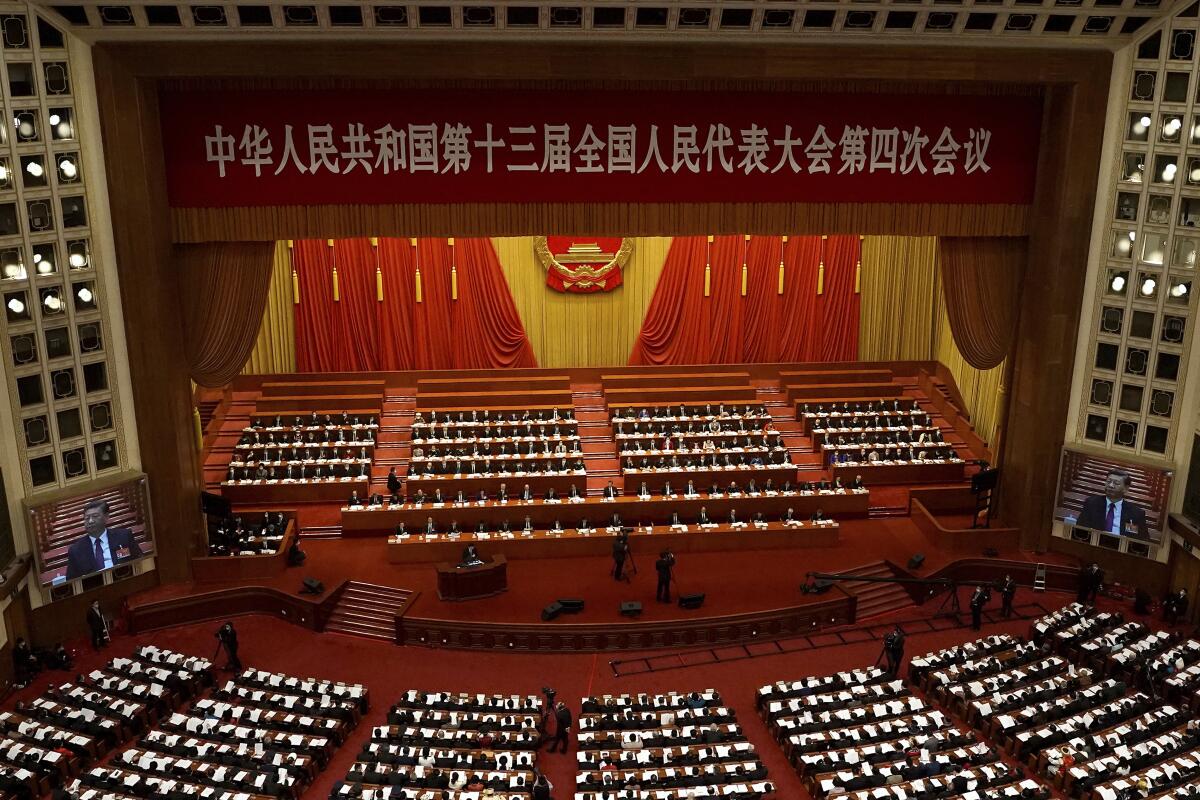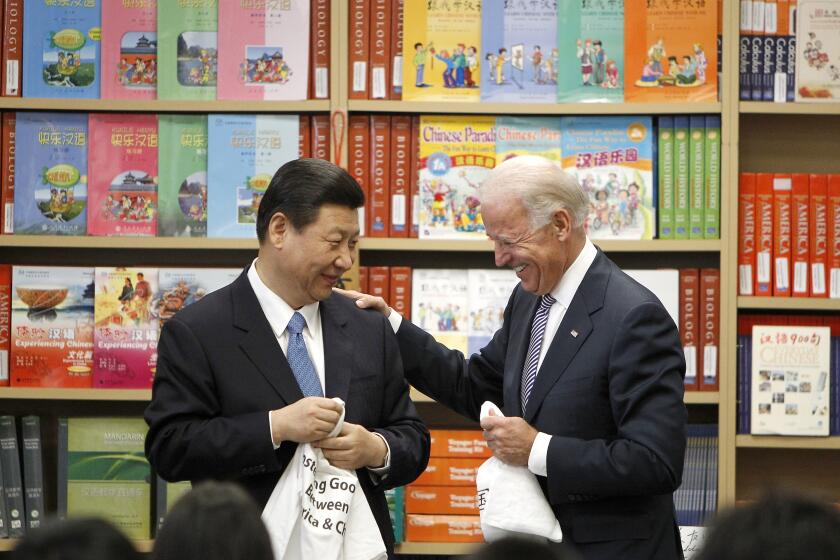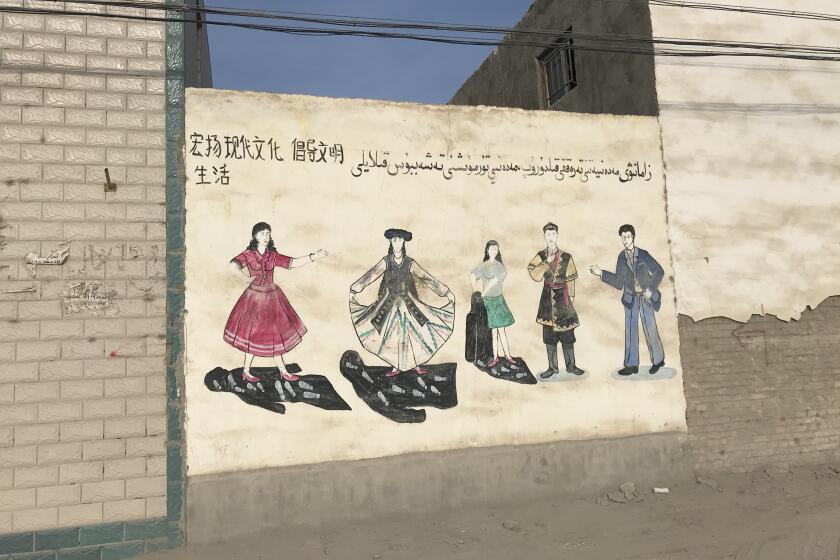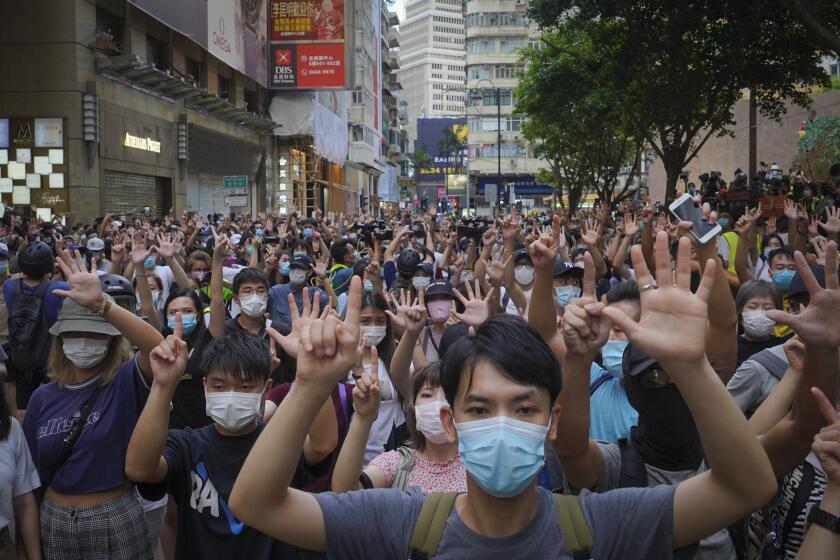U.S. sanctions 24 Chinese, Hong Kong officials ahead of first face-to-face talks

- Share via
HONG KONG — The U.S. sanctioned an additional 24 Chinese and Hong Kong officials over Beijing’s ongoing crackdown on political freedoms in the semi-autonomous city, just ahead of the Biden administration’s first face-to-face talks with China.
The step reflects Washington’s “deep concern” about the erosion of Hong Kong’s autonomy following changes to its election system endorsed by China’s ceremonial legislature last week, Secretary of State Antony Blinken said in a statement Wednesday.
Foreign financial institutions that deal with the 24 officials would be subject to U.S. sanctions, the State Department said.
The planned changes to Hong Kong’s electoral law give a pro-Beijing committee power to appoint more of Hong Kong’s lawmakers. The move will reduce the proportion of those who are directly elected and ensures that only those determined to be truly loyal to Beijing are allowed to run for office, shutting opposition figures out of the political process.
The U.S. announcement was made during a joint visit by Blinken and Defense Secretary Lloyd Austin to Japan and South Korea, U.S. allies that are both wary of China’s growing economic, military and political heft.
The imposition of new sanctions “fully exposes the U.S. side’s sinister intention to interfere in China’s internal affairs, disrupt Hong Kong and obstruct China’s stability and development,” Chinese Foreign Ministry spokesperson Zhao Lijian told reporters at a briefing Wednesday.
President Biden has his first conversation with President Xi Jinping of China.
“China will take strong measures as appropriate to resolutely defend national sovereignty, security and development interests,” Zhao said.
While in Tokyo, Blinken and Austin delivered a joint statement with their Japanese counterparts expressing concern over Beijing’s human rights violations against ethnic minorities in the western Xinjiang region and China’s determination to alter the status of a group of uninhabited islands administered by Tokyo but claimed by Beijing. Blinken and Austin arrived in Seoul on Wednesday for talks.
On Thursday, Blinken and national security advisor Jake Sullivan are scheduled to meet Chinese Foreign Minister Wang Yi and the foreign affairs chief of China’s ruling Communist Party, Yang Jiechi, in Anchorage.
The White House has set low expectations for the meeting. A senior Biden administration official, who briefed reporters on condition of anonymity, said the two sides would not deliver a joint statement, and no major announcements were expected.
China demands that the U.S. drop a ban on cotton and tomato from Xinjiang, slamming reports that Muslim Uighurs produce them by forced labor.
The U.S. has said Thursday’s meeting will be an initial opportunity to address intense disagreements over trade and human rights in Tibet, Hong Kong and Xinjiang as well as the COVID-19 pandemic.
While President Biden has sought to ease the harsh tone that former President Trump took with China, his administration appears committed to taking a tough line on those issues.
China has rejected criticism of its policies toward Hong Kong, accusing foreign governments of interfering and saying political tightening was necessary following months of anti-government protests in 2019.
Last June, Beijing imposed a sweeping national security law on the city, and Hong Kong authorities have arrested most of the prominent pro-democracy supporters and outspoken critics. Many others have fled abroad and renewed their calls this week for members of the Hong Kong diaspora to keep up the fight for the freedoms promised to the city after the 1997 end of British colonial rule.
Ferocious repression in Hong Kong will make it easier for President Biden to recruit wavering Western democracies to challenge China.
Among those included in the U.S. sanctions are Wang Chen, a member of the Chinese Communist Party’s elite 25-member Politburo, and Tam Yiu-chung, the Hong Kong delegate to the Chinese parliament’s standing committee, which drafted the national security law.
Several officers from Hong Kong’s National Security Division were also sanctioned, including Li Kwai-wah, a senior superintendent, and Edwina Lau, a deputy commissioner of the Hong Kong police force and the head of the division.
Starting last October, the U.S. had already sanctioned 10 officials, including Hong Kong leader Carrie Lam and Deputy Director of the Hong Kong and Macao Affairs Office Zhang Xiaoming. Sanctions forbid their travel to the U.S. and block their dealings with American financial institutions.
Lam said in a television interview in November that the sanctions meant she receives her salary in cash and has “piles of cash” at home because she was cut off from banking services in Hong Kong.
Chinese officials have shrugged off the impact of sanctions, with some calling them a badge of pride because of what they view as an attempt to undermine Chinese control in Hong Kong and its rise as a competitor to the U.S.
More to Read
Sign up for Essential California
The most important California stories and recommendations in your inbox every morning.
You may occasionally receive promotional content from the Los Angeles Times.
















